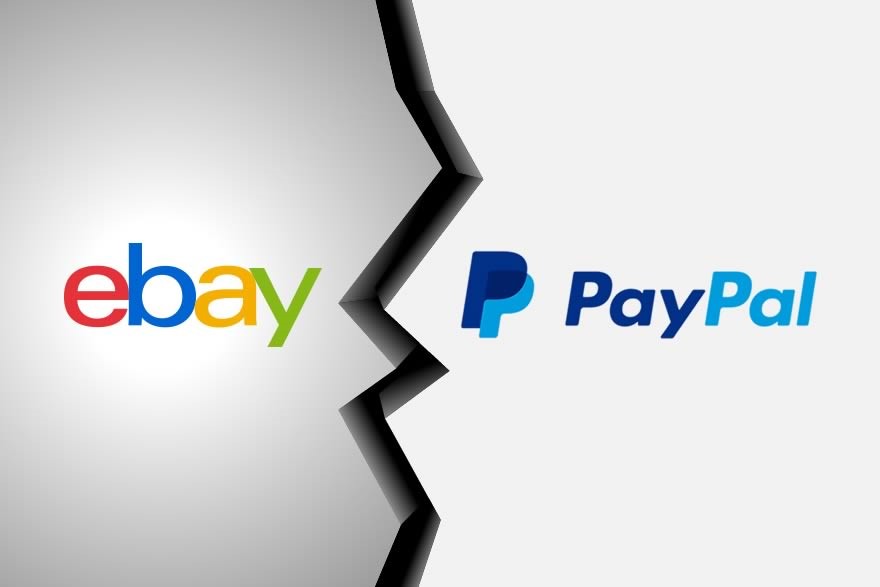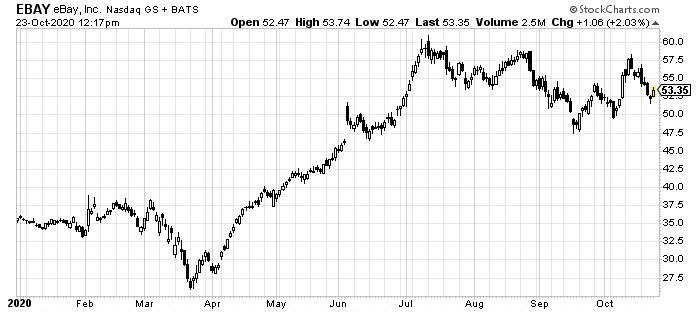Some companies find success in adding new and exciting products and services to their menu.
Others, however, are their best by sticking to what they know.
Amazon.com Inc. (NASDAQ: AMZN) is certainly the former.
But the company it has replaced from the first tech boom, eBay Inc. (NASDAQ: EBAY), is definitely the latter type.
The company itself recognized the problem a few years ago. It had acquired its payment partner in 2002.
By 2015, both sides realized it was best if they split. So, they did.

In fact, just a few months ago, their mutually-agreed primary payment deal finally ended.
But eBay had been much busier since its 1990s rocket start as one of the early adopters of eCommerce.
It had piled into ideas like classifieds and Stubhub. On the surface, these seemed like perfect fits.
But both of these businesses had been drains on company resources over their tenure at the company.
That’s when eBay’s intervention came.
In early 2019, activist investment group Elliott Management stepped in, announced it had purchased a large chunk of eBay shares and demanded changes.
The group published a five-point plan to turn things around for the fledgling eCommerce dinosaur.
With the likes of Amazon, and as I wrote yesterday, brick-and-mortar companies, nipping at the heels of eBay, something had to give.
Elliott spelled out a recipe.
Often, when a company, especially one as established as eBay is, receives an ultimatum like this, it doesn’t go well. Think of a real-world intervention.
It can go one of two ways. And sometimes it ends in broken relationships or worse.
Fortunately for everyone involved, eBay executives realized they had a problem. Or, at the very minimum, realized Elliott had some strong arguments.
Chief amongst them was to unlock some of their corporate coffers.
The company complied and raised its share buyback plan and issued its first-ever dividend.
Second on the list of changes, Elliott had so nicely framed as “either you do it or we will,” was to be done with its side ventures.
For eBay to reach its potential and grow its share price, the activists argued, it had to go back to its roots. Focus on its core platform.
And it did.
It took less than a year before eBay’s board not only took on members from Elliott but to also start looking to unload its side businesses.
It found a buyer for StubHub in Viagogo, a European counterpart.
That deal alone brought in more than $4 billion in all cash in February of this year when it closed.
The eCommerce giant also seems to have found a buyer for its classifieds group in Adevinta, another European-based company.
That one is pending, but could be worth $9.2 billion in cash and stock.
That’s exactly what the intervention intended.
So far, this has been all great news. And it is already showing for the company’s bottom line.
During the second quarter, income from continuing operations improved 125%.
Who says those 90s tech companies can’t grow like the new ones currently dominating the Nasdaq?
Part of this success also has to do with how eBay has handled its core business.

Grab a piece of paper and pen to write this down…
Because you’re about to see the name and ticker symbol of the ONLY 5G STOCK every investor should own.
You can get the name and ticker of this company right here, no strings attached. But you better act fast…
Because the Federal Communications Commission, the government agency in charge of 5G, just scheduled a major announcement that would send shares soaring once announced.
Don't miss out. Click Here to Get #1 5G play for 2020 before the next market close.
Rather than bringing in outside help like PayPal or StubHub, the company is now building out its own core business for what seems like the first time in decades.
Upon severing its formal ties to PayPal earlier this summer, the company announced a new payment program allowing customers to use Apple Pay, Google Pay, credit cards, and yes, PayPal.
And just this week, eBay found its core appeal again; it launched a program called “certified refurbished.”
By partnering with original product makers like Philips and Hoover, it is labelling certain products on its site “certified.”
That’s what people use eBay for. If they only wanted new items, they have choices… like Amazon.
This new program is exactly what Elliott Management had in mind 18 months ago.
Investors are aware that eBay is doing better. Shares are indeed up 47% year to date.

But that pales in comparison to other eCommerce giants. Amazon has nearly doubled that performance.
And none of this even begins to discuss how low investors valued eBay before it found its groove again.
Despite this sizable share price appreciation, shares of EBAY still trade at just 13.3 times their forward earnings.
To put that in perspective, Amazon trades at 71.6 times its forward earnings.
It’s almost hard to fathom that eBay, which clearly had its heyday more than 20 years ago, is an emerging profit idea.
But apparently, corporate interventions work. And there’s room for it to fly again as it did back when people were using dialup internet.
The company reports its third-quarter earnings next week. It’ll also get headlines when its classifieds deal closes.
Investors will wake up to its deep discount. You should consider beating them to the punch.
To your prosperity and health,
Joshua M. Belanger
Executive Publisher & Founder